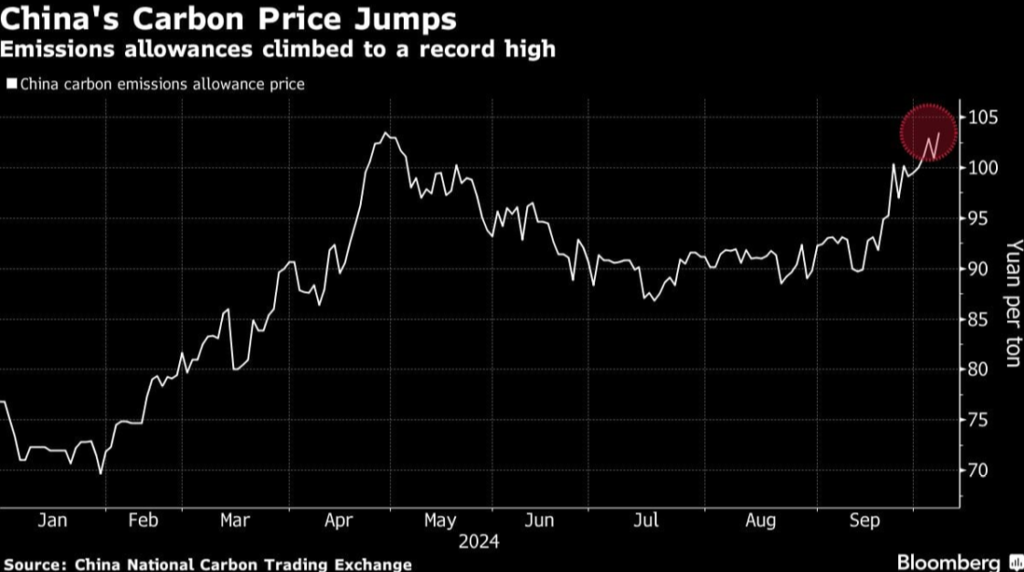Welcome to our monthly newsletter, Carbon Market News Roundup, the goal of which is to introduce our audience to a new asset class market in the making: the carbon market. Our previous issues, along with the rest of our commentaries, may be read here.
In the last issue we explored effective climate policies and emissions reductions, innovations and alternatives in energy and fuel, and a landmark investment in carbon capture technology. In this issue, we explore important developments in both compliance and voluntary carbon markets from China to the US, as well as the negative impacts of climate change, which affects the full spectrum of global security, economics, and politics.
Carbon Market Developments
China Carbon Prices Reach All-Time High At $14.62 Per Ton
Jennifer L, CarbonCredits.com
Treasury’s Adeyemo Talks Up Voluntary Carbon Market
Alastair Marsh, Bloomberg
Carbon markets capture the spotlight at Climate Week NYC
Jordan Wolman, Politico
The recent developments in carbon markets highlight the increasing importance of regulatory frameworks and market mechanisms in driving global climate action. In China, the national carbon market has seen a significant surge in prices, with emissions permits reaching an all-time high (see chart below).

This spike is driven by industries racing to meet compliance deadlines and tighter government regulations aimed at reducing emissions. The Chinese carbon market, which includes both a mandatory Emission Trading System (ETS) and a voluntary greenhouse gas reduction scheme, has expanded to cover major emitting sectors and represents a substantial portion of the country’s total emissions. The market’s growth is seen as a crucial step towards achieving China’s climate commitments of peaking emissions before 2030 and reaching carbon neutrality by 2060. The inclusion of additional sectors and stricter emissions caps are expected to further push industries towards cleaner energy solutions and lower-carbon operations.

On the other hand, the voluntary carbon market (VCM) is gaining momentum despite facing criticism and contraction in recent years. At the first-ever “VCM Day” held during New York Climate Week, key figures from the private and public sectors highlighted the potential of VCMs to channel private capital into impactful climate projects. The Biden administration’s framework for high-quality carbon offsets aims to improve market integrity and transparency, addressing concerns over greenwashing and the effectiveness of carbon credits. This renewed focus on VCMs reflects a broader recognition of their role in complementing regulatory efforts and mobilizing financial resources for emissions reductions, particularly in developing countries.
Together, these developments underscore a pivotal moment for carbon markets globally. The increasing regulatory scrutiny and market-driven approaches are expected to enhance the effectiveness of carbon markets as tools for reducing greenhouse gas emissions. As China integrates more industries into its ETS and the VCM gains legitimacy and scale, these markets could play a critical role in steering the world towards its climate goals. The lessons learned from these initiatives may also provide valuable insights for other countries seeking to implement or expand their own carbon markets, fostering a more coordinated and impactful global response to climate change.
Effects of Climate Change
The Mother of All Security Crises
Lawrence Wilkerson, Project Syndicate
How Climate Change Threatens Democracy
Karen Florini and Alice C. Hill, Foreign Affairs
2024, a year of agricultural calamities driven by climate change
Mathilde Gérard, Le Monde
Climate change is intensifying extreme weather events globally, disrupting agriculture, impacting elections, and creating security challenges. In 2024, which is on track to be the hottest year on record, countries across every continent have experienced extreme weather events that have disrupted agricultural production. France saw a 22% decrease in cereal production due to excessive rain in the north and drought in the south. Agricultural giant Brazil also endured widespread drought and flooding.

Hurricane Helene devastated tens of thousands of southeastern farms in the US in late September, while in Namibia, drought conditions forced the slaughter of hundreds of wild animals to feed the population. Global warming is also impacting water resources, leading to instability in agricultural production and stagnation of crop yields in some countries with industrialized agriculture.

Climate change is also impacting elections worldwide. Between 2019 and 2024, over a dozen countries faced extreme weather events near election times. Cyclones Idai and Kenneth in Mozambique in early 2019 displaced over 400,000 people, destroyed infrastructure, and impeded voter registration. In Pakistan in 2022, extreme precipitation and flooding displaced nearly 8 million people, damaged polling places, and disrupted the national election. In 2022, Hurricane Ian in Florida, with rainfall exacerbated by climate change, impacted over 12% of registered voters just weeks before the midterm elections. Canada’s worst wildfire season on record in 2023 hampered regional elections, and extreme heat in Spain during the July 2023 elections led some voters to wear swimwear to the polls.
The security implications of climate change are becoming increasingly apparent. As climate change intensifies, events like the 2004 tsunami in Indonesia that killed 230,000 people, Typhoon Haiyan in the Philippines in 2013 that killed 8,000, and the 2011 earthquake and tsunami in Japan that caused the nuclear radiation release at the Fukushima Daiichi Nuclear Power Plant are predicted to become more frequent. Computer models, especially those focused on oceans, suggest increasingly alarming scenarios, with rising sea levels potentially exceeding 10 feet globally.

Climate migration is expected to surge, with estimates reaching over half a billion people by the end of the century. This mass displacement could lead to border militarization and the curtailing of asylum processes. The 2022 floods in Pakistan, which submerged one-third of the country, foreshadow the scale of future climate-related disasters. East, Central, and North Africa, along with parts of Latin America, are currently experiencing the severe impacts of drought, heat, crop failures, and water scarcity, leading to increased migration, as exemplified by the growing crisis in the Mediterranean.

